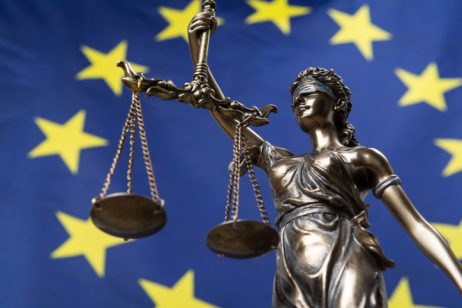On 18 July 2025, the European Union took a significant new step in its sanctions strategy by adopting an expanded package targeting Russia and Belarus

This 18th sanctions package is notable in both scope and legal sophistication, reflecting a clear political intent to close loopholes, target logistical support networks, and tighten anti-circumvention measures.
Several legal instruments have substantially broadened the range of economic, commercial, and financial prohibitions while introducing innovative legal safeguards—particularly against abusive legal claims based on investment treaties. The EU’s sanctions arsenal also expands with a more assertive extraterritorial reach, targeting entities based in third countries that enable circumvention of restrictive measures.
At the sectoral level, the EU has deepened its differentiated approach:
- On one side, by strengthening the regime applicable to Belarus in response to its direct support for Russian military and logistical operations;
- On the other, by significantly tightening sanctions on Russia—particularly regarding the oil price cap, crypto-assets, industrial software, and critical energy infrastructure.
Additional implementing regulations and decisions expand the lists of individuals and entities subject to asset freezes, transaction bans, and targeted measures.
This article provides an in-depth analysis of the legal instruments adopted on 18 July 2025, highlighting key emerging trends shaping the EU sanctions regime.
Tightening of the Sanctions Regime Against Belarus: Council Decision (CFSP) 2025/1471 and Council Regulation (EU) 2025/1472
With the adoption of Decision (CFSP) 2025/1471 and Regulation (EU) 2025/1472, the EU is responding to Belarus’s active support for Russia’s military aggression in Ukraine by reinforcing both sectoral bans and legal protection mechanisms.
A Coordinated Expansion of Sectoral Restrictions
The decision introduces several new prohibitions, immediately transposed into EU law by the regulation. Together, they:
- Ban the purchase, import, or transfer—direct or indirect—into the EU of any arms or related materials from Belarus, except under narrowly defined exceptions (e.g. pre-existing contracts, safety, maintenance);
- Significantly expand the list of export-restricted goods, now including dual-use technologies, CNC machine tools, sensitive chemicals, and industrial metal or plastic components that could enhance Belarusian defense capabilities;
- Strengthen controls over indirect exports by introducing a prior authorisation mechanism whenever there is a credible risk of diversion to Belarus via third countries.
Blocking Belarusian Financial and Banking Channels
The regulation also tightens restrictions on financial flows:
- SWIFT-related bans are extended into a broader prohibition on all transactions with several listed Belarusian banks;
- Crypto-asset service providers operating on behalf of Belarusian entities are banned from accessing the EU market;
- Limited exemptions apply for specific diplomatic, humanitarian, or private transactions (e.g. involving EU citizens residing in Belarus or to wind down existing operations).
Legal Protection Against Abusive Investment Treaty Claims
Beyond economic measures, the EU introduces a new legal safeguard:
- The recognition and enforcement of foreign arbitral awards or court rulings that challenge the impact of EU sanctions is explicitly prohibited;
- Such claims are deemed contrary to the EU’s public order, rendering them unenforceable in Member States;
- The EU and its Member States may seek damages from entities that act in bad faith by initiating such proceedings.
This marks a qualitative shift in the sanctions regime—enhancing its material impact while also shielding it from legal abuse.
Escalation of Sanctions Against Russia: Council Decision (CFSP) 2025/1495 and Council Regulation (EU) 2025/1494
In parallel with Belarus measures, the EU has strengthened its sanctions against the Russian Federation through Decision (CFSP) 2025/1495 and Regulation (EU) 2025/1494, amending Decision 2014/512/CFSP and Regulation (EU) No 833/2014, respectively.
Extraterritorial Reach and Anti-Circumvention Focus
The scope of targeted entities now includes 26 additional organisations, some based in third countries suspected of supplying Russia’s military-industrial complex. The new extraterritorial mechanism allows third-country entities to be sanctioned if they knowingly facilitate circumvention.
Several foreign companies involved in supplying Russia with critical components (e.g. semiconductors, sensors, drones) are now subject to the same export bans and service prohibitions as directly listed Russian entities. Enhanced cooperation frameworks aim to improve customs enforcement and traceability of sensitive trade flows.
Energy Lockdown: Ending Derogations and Blocking Infrastructure
The energy sector remains a core focus:
- The temporary exemption allowing Czechia to import Russian crude oil via pipeline is revoked;
- Imports of petroleum products refined in third countries using Russian crude are now banned;
- LNG terminals not connected to the EU grid may no longer be used to import Russian gas;
- All transactions related to the Nord Stream and Nord Stream 2 infrastructure are explicitly prohibited, including any potential reactivation.
Financial, Digital, and Technological Isolation
The EU also broadens financial and tech-related measures to limit Russia’s access to capital and digital tools:
- All dealings with the Russian Direct Investment Fund (RDIF) and its affiliates are banned;
- The provision of specialized software in banking, energy, and industrial sectors is prohibited;
- Restrictions on crypto-asset service providers—especially those involved in cloaked or evasive operations—are extended, including those located in third countries.
These steps aim to weaken Russia’s wartime economic architecture and reduce its international lifelines.
Legal Shields Against Abusive Treaty-Based Claims
As with Belarus, Russia sanctions now include legal protections against investor-state dispute mechanisms:
- Recognition or enforcement of arbitral awards or foreign judgments undermining EU sanctions is barred within the Union;
- EU institutions and Member States may seek compensation from those who initiate such claims in bad faith.
Refining the Oil Price Cap Mechanism
The oil price cap on Russian seaborne crude is now subject to automatic adjustment every six months. The capped price must remain at least 15% below the global average, balancing reduced Russian revenues with global market stability.
Enhanced Individual Targeting: Updated EU Sanctions Lists
In addition to sectoral measures, the EU has refined its targeting of individuals and entities directly or indirectly involved in the war against Ukraine. These updates aim for greater granularity by blocking structural enablers of the Russian and Belarusian war economies.
Targeting Belarusian Defense Industry
Council Implementing Decision (CFSP) 2025/1461 updates the annexes of Decision 2012/642/CFSP to include eight Belarusian entities active in arms, optics, and dual-use tech. These include:
- Belvneshpromservice (military exports),
- OKB TSP (air defense systems),
- KB Unmanned Helicopters (military drones),
- Legmash Plant OJSC (heavy munitions),
- LEMT (BelOMO), Laser Devices and Technologies, JSC Vistan, and Rukhservomotor LLC.
This is part of a broader effort to choke logistical pathways supporting Russia via Belarus.
Council Implementing Regulation (EU) 2025/1469 mirrors these designations in Regulation (EC) No 765/2006, imposing:
- Asset freezes within the EU,
- A ban on the provision of funds or economic resources,
- A prohibition on financing or supplying goods or services.
Extension of Individual Sanctions Against Russia
The EU has also added 19 individuals and 22 Russian entities to Annex I of Regulation (EU) No 269/2014. These fall into three categories:
- Military-industrial actors: Makers of precision weapons, drones, and robotics R&D centers;
- Sanctions evasion facilitators: Shell companies, offshore banks, and logistical intermediaries based in third countries;
- Political and military leadership: High-ranking figures involved in Ukraine bombings, forced conscription in occupied regions, or propaganda/repression efforts.
These listings aim to target the operational and human pillars of Russia’s war machine—curbing their financial, logistical, and diplomatic freedom.
Latest news
EU General Court Rules for the First Time on Damages Claims After the Annulment of Sanctions
The General Court of the European Union (EU) recently delivered a judgment in a case concerning the non-contractual liability of the Union (GC, Pumpyanskiy v Council, T-369/24), brought by a citizen holding Russian and Swiss nationality following the adoption of restrictive measures against him—the individual concerned being listed in Annex I to Regulation (EU) No… Continue reading EU General Court Rules for the First Time on Damages Claims After the Annulment of Sanctions

A Judicial Storm Looms: How the Central Bank Can Challenge the Confiscation of Reserves in the EU
In one week, European Union leaders could approve proposals by the European Commission to “pledge as collateral” Russia’s immobilized sovereign reserves for a “reparations loan” to Ukraine. The vast majority of the Russian Central Bank’s (RCB) assets are located in Belgium (Euroclear), whose Prime Minister has repeatedly warned that transferring these assets for Ukraine’s benefit… Continue reading A Judicial Storm Looms: How the Central Bank Can Challenge the Confiscation of Reserves in the EU
Harmonisation and Clarification of the EU Sanctions Regime: Insertion of the Concepts of “Ownership” and “Control”
Pursuant to Article 2 of Regulation (EU) No 269/2014, concerning restrictive measures in respect of actions undermining or threatening the territorial integrity, sovereignty and independence of Ukraine, natural or legal persons designated in Annex I to that Regulation are subject to the freezing of all funds and economic resources belonging to them. It is also… Continue reading Harmonisation and Clarification of the EU Sanctions Regime: Insertion of the Concepts of “Ownership” and “Control”
Political communication on tax matters, first lesson: Present as exceptional what is meant to become structural.
Nearly fifteen years ago, the 2012 Finance Act introduced an apparently temporary tax, the Exceptional Contribution on High Incomes (CEHR), conceived “in a context of reducing public deficits and restoring our public finances,” intended “to request an exceptional effort from the wealthiest taxpayers.”¹






